婴幼儿日常英语亲子大全
亲子日常英语绝密.大全
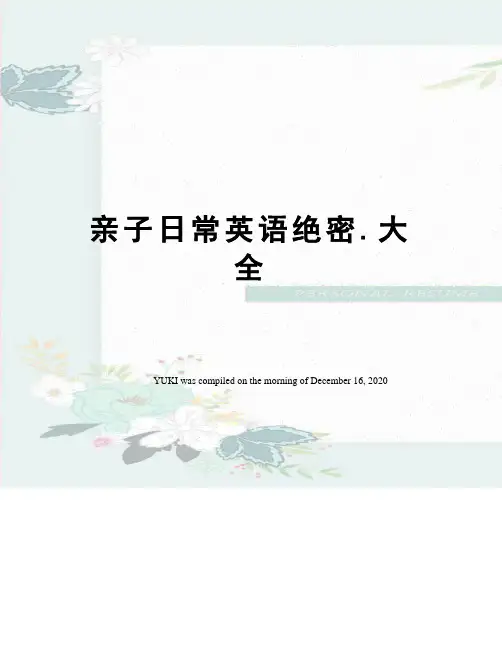
亲子日常英语绝密.大全YUKI was compiled on the morning of December 16, 2020亲子日常英语目录1 G ETTING UP 起床 .................. 错误!未定义书签。
2 G ETTING D RESSED 穿着 .............. 错误!未定义书签。
3 T AKING A BATH 洗澡................ 错误!未定义书签。
4 G OING-OFF 出门................... 错误!未定义书签。
5 C OMING H OME 回家 ................. 错误!未定义书签。
6 W ASHING YOUR HANDS 洗手............ 错误!未定义书签。
7 C OOKING 做饭..................... 错误!未定义书签。
8 E ATING 吃饭...................... 错误!未定义书签。
9 A BOUT HOMEWORK关于功课............ 错误!未定义书签。
10 E XAMINATION 考试.................. 错误!未定义书签。
11 W ATCHING TV看电视................ 错误!未定义书签。
12 S LEEP AND REST 睡觉和休息.......... 错误!未定义书签。
13 B ABYSITTING 照看孩子.............. 错误!未定义书签。
14 U SING THE TOILET上厕所 ............ 错误!未定义书签。
15 P LAYING TOYS/GAMES 玩玩具/游戏..... 错误!未定义书签。
16 O UTDOOR A CTIVITY 户外活动.......... 错误!未定义书签。
17 WALKING 散步..................... 错误!未定义书签。
少儿英语常用单词
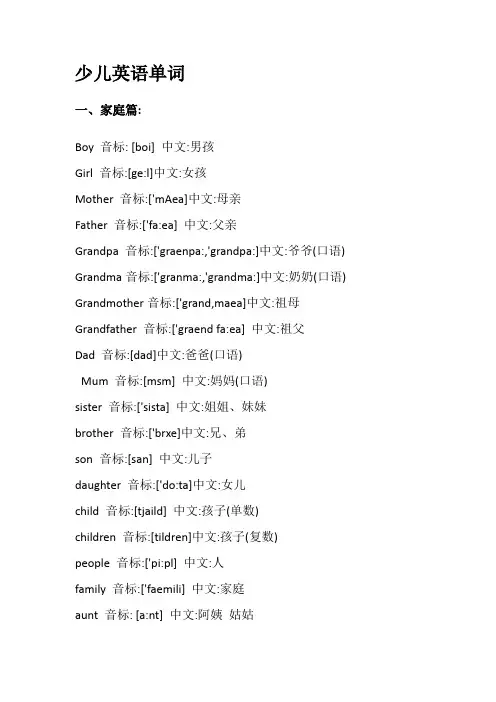
少儿英语单词一、家庭篇:Boy 音标: [boi] 中文:男孩Girl 音标:[ge:l]中文:女孩Mother 音标:['mAea]中文:母亲Father 音标:['fa:ea] 中文:父亲Grandpa 音标:['graenpa:,'grandpa:]中文:爷爷(口语) Grandma音标:['granma:,'grandma:]中文:奶奶(口语) Grandmother音标:['grand,maea]中文:祖母Grandfather 音标:['graend fa:ea] 中文:祖父Dad 音标:[dad]中文:爸爸(口语)Mum 音标:[msm] 中文:妈妈(口语)sister 音标:['sista] 中文:姐姐、妹妹brother 音标:['brxe]中文:兄、弟son 音标:[san] 中文:儿子daughter 音标:['do:ta]中文:女儿child 音标:[tjaild] 中文:孩子(单数)children 音标:[tildren]中文:孩子(复数)people 音标:['pi:pl] 中文:人family 音标:['faemili] 中文:家庭aunt 音标: [a:nt] 中文:阿姨姑姑uncle 音标:[^nkl]中文:叔叔舅舅teacher 音标:[ti:tj]中文:老师principal 音标:['prinsopal]中文:校长二、身体篇:body 音标:['bodi] 中文:身体hair 音标:[hea]中文:头发head 音标:[hed] 中文:头eye 音标:[ai] 中文:眼睛face 音标:[feis] 中文:脸neck 音标:[nek] 中文:脖子arm 音标:[a:m] 中文:手臂leg 音标:[leg] 中文:腿hand 音标:[haend]中文:手foot 音标: [fut]中文:脚toe 音标:[təu]中文:脚趾finger 音标:[fing=]中文:手指ear 音标:[i]中文:耳朵nose 音标:[nauz]中文:鼻子mouth 音标:[mau0] 中文:嘴巴tooth 音标:[tu:0] 中文:牙齿shoulder 音标:['∫ulde] 中文:肩膀knee 音标:[ni:] 中文:膝盖三、颜色篇Color 音标:['ksla]中文:颜色red 音标:[red] 中文:红色Blu 音标: [blu:] 中文:蓝色Yellow 音标:['jelau] 中文:黄色Green 音标:[gri:n]中文:绿色Black 音标:[blk] 中文:黑色White 音标:[(h)wait]中文:白色Purple 音标:['pe:pl] 中文:紫色Orange 音标:['orind3]中文:橙色四、交通工具篇:car 音标:[ka:]中文:小汽车bus 音标:[bxs] 中文:公共汽车jeep 音标:[d3i:p]中文:吉普车bike 音标:[baik] 中文:自行车motorcycle 音标:['mautasaikl]中文:摩托车train 音标:[trein]中文:火车ship音标:[íip]中文:船boat 音标:[bout]中文:小船airplane 音标:[e>,plein]中文:飞机plane 音标:[plein] 中文:飞机taxi 音标:['taeksi] 中文:出租车五、职业teacher教师student学生TVreporter电视台记者nurse护士actor男演员driver司机weather reporter天气预报singer歌唱家salesperson销售员actress女演员accountant会计writer作家doctor医生artist画家policewoman(女)警察cleaner清洁工farmer农民policeman(男)警察baseballplayer棒球运动员police警察七、食品、饮料rice 米饭bread面包beef牛肉milk 牛奶water 水egg蛋fish 鱼tofu豆腐cake 蛋糕""cookie 曲奇biscuit饼干jam果酱noodles面条tea茶meat 肉chicken鸡肉pork猪肉salad 沙拉soup汤Coke可乐mutton羊肉ice 冰ice-cream 冰淇淋juice 果汁coffee 咖啡" breakfast 早餐lunch午餐dinner/supper晚餐meal 一餐hot dog 热狗hamburger汉堡包French fries 炸薯条vegetable 蔬菜。
亲子日常英语大全
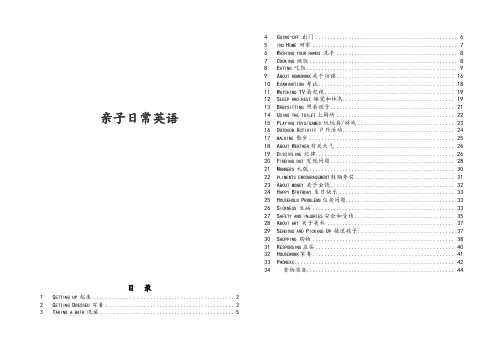
亲子日常英语目录1G ETTING UP 起床 (2)2G ETTING D RESSED 穿着 (3)3T AKING A BATH 洗澡............................................. 54G OING-OFF 出门.. (6)5ING H OME 回家 (7)6W ASHING YOUR HANDS 洗手 (8)7C OOKING 做饭 (8)8E ATING 吃饭 (9)9A BOUT HOMEWORK关于功课 (16)10E XAMINATION 考试 (18)11W ATCHING TV看电视 (19)12S LEEP AND REST 睡觉和休息 (19)13B ABYSITTING 照看孩子 (21)14U SING THE TOILET上厕所 (22)15P LAYING TOYS/GAMES 玩玩具/游戏 (23)16O UTDOOR A CTIVITY 户外活动 (24)17WALKING 散步 (25)18A BOUT W EATHER有关天气 (26)19D ISCIPLINE 纪律 (26)20F INDING OUT 发现问题 (28)21M ANNERS 礼貌 (30)22PLIMENTS ENCOURAGEMENT鼓励夸奖 (31)23A BOUT MONEY 关于金钱 (32)24H APPY B IRTHDAY 生日快乐 (33)25H OUSEHOLD P ROBLEMS住房问题 (33)26S ICKNESS 生病 (33)27S AFETY AND INJURIES安全和受伤 (35)28A BOUT ART 关于美术 (37)29S ENDING AND P ICKING U P 接送孩子 (37)30S HOPPING 购物 (38)31R ESPONSING应答 (40)32H OUSEWORK家务 (41)33P HONEXX (42)34食物准备 (44)1Getting up 起床A.赖床It's time to get up. 该起床了。
一天中最常用的亲子英语
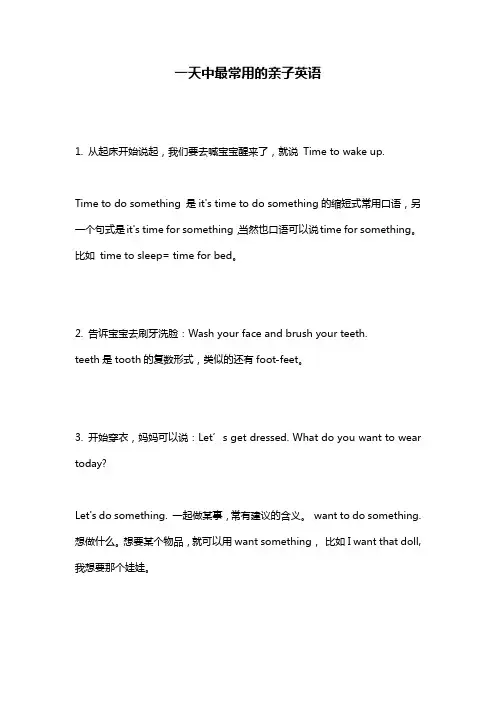
一天中最常用的亲子英语1. 从起床开始说起,我们要去喊宝宝醒来了,就说Time to wake up.Time to do something 是it's time to do something的缩短式常用口语,另一个句式是it's time for something,当然也口语可以说time for something。
比如time to sleep= time for bed。
2. 告诉宝宝去刷牙洗脸:Wash your face and brush your teeth.teeth是tooth的复数形式,类似的还有foot-feet。
3. 开始穿衣,妈妈可以说:Let’s get dressed. What do you want to wear today?Let's do something. 一起做某事,常有建议的含义。
want to do something. 想做什么。
想要某个物品,就可以用want something,比如I want that doll, 我想要那个娃娃。
4. 一切就绪,该吃早饭了!妈妈说:Come and eat your breakfast.come and do something, 过来做某事,在口语中常常省略and,所以可以说come eat your breakfast,或者come brush your teeth.5. 然后就要去上学了对不对。
妈妈问问孩子书包准备好了没有,车要来了 (i)you pack your bag? Hurry, it’s about time for the bus.pack 整理,打包,常见的词组有pack up 也是打包的意思,可加名词也可不加。
It's about time for something 跟it's time for something相比更有一种时间紧迫的含义。
亲子英语 日常对话
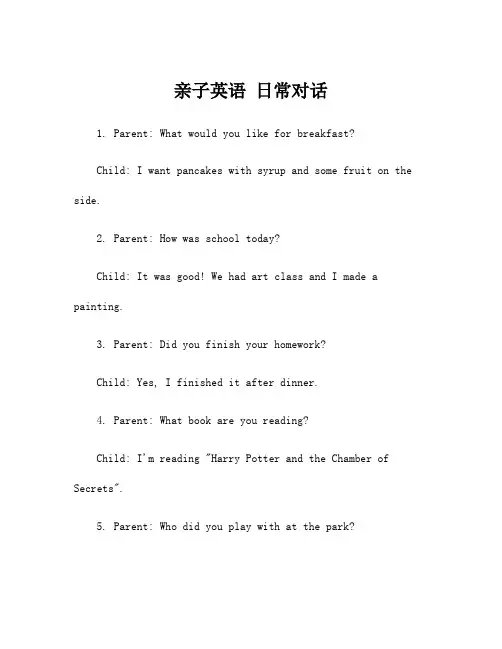
亲子英语日常对话1. Parent: What would you like for breakfast?Child: I want pancakes with syrup and some fruit on the side.2. Parent: How was school today?Child: It was good! We had art class and I made a painting.3. Parent: Did you finish your homework?Child: Yes, I finished it after dinner.4. Parent: What book are you reading?Child: I'm reading "Harry Potter and the Chamber of Secrets".5. Parent: Who did you play with at the park?Child: I played with my friend Alex. We had a lot of fun on the swings.6. Parent: How was your playdate at Sarah's house?Child: It was great! We played board games and watched a movie.7. Parent: Can you please put your toys away?Child: Yes, I will clean up my toys before bedtime.8. Parent: What do you want to do this weekend?Child: I want to go to the zoo and see the lions and giraffes.9. Parent: What did you learn in science class today?Child: We learned about the solar system and the planets.10. Parent: Are you ready for bed?Child: Yes, I brushed my teeth and put on my pajamas.。
爸爸妈妈最常用的日常亲子英语
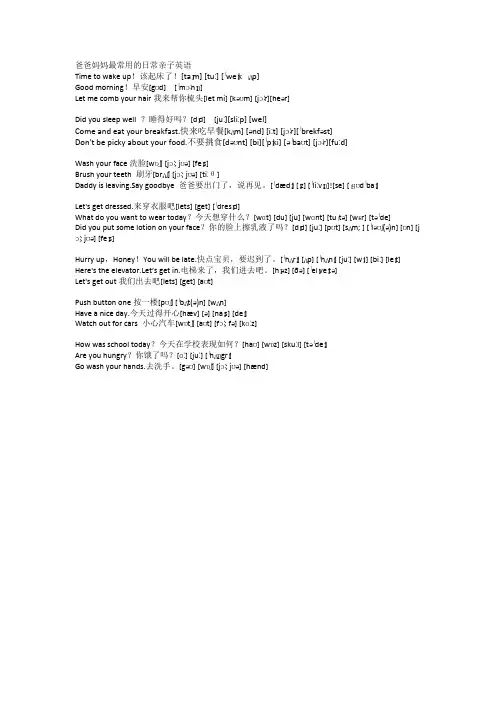
爸爸妈妈最常用的日常亲子英语Time to wake up!该起床了![taɪm] [tuː] [ˈweɪk ˌʌp]Good morning!早安[gʊd] [ˈmɔːnɪŋ]Let me comb your hair我来帮你梳头[let mi] [kəʊm] [jɔːr][heər]Did you sleep well ?睡得好吗?[dɪd] [juː][sliːp] [wel]Come and eat your breakfast.快来吃早餐[kʌm] [ənd] [iːt] [jɔːr][ˈbrekfəst]Don't be picky about your food.不要挑食[dəʊnt] [bi][ˈpɪki] [əˈbaʊt] [jɔːr][fuːd]Wash your face洗脸[wɒʃ] [jɔː; jʊə] [feɪs]Brush your teeth 刷牙[brʌʃ] [jɔː; jʊə] [tiːθ]Daddy is leaving.Say goodbye 爸爸要出门了,说再见。
[ˈdædɪ] [ɪz] [ˈliːvɪŋ]![se] [ˌɡʊdˈbaɪ]Let's get dressed.来穿衣服吧[lets] [get] [ˈdresɪd]What do you want to wear today?今天想穿什么?[wɑt] [du] [ju] [wɑnt] [tuˌtə] [wɛr] [təˈde]Did you put some lotion on your face?你的脸上擦乳液了吗?[dɪd] [juː] [pʊt] [sʌm; ] [ˈləʊʃ(ə)n] [ɒn] [j ɔː; jʊə] [feɪs]Hurry up,Honey!You will be late.快点宝贝,要迟到了。
[ˈhʌrɪ] [ʌp] [ˈhʌnɪ] [juː] [wɪl] [biː] [leɪt] Here's the elevator.Let’s get in.电梯来了,我们进去吧。
婴幼儿日常英语亲子大全
1. Diminutive/child-like words for things: 小孩喜欢的物品cuddly (any plush toy, stuffed animal, etc) 想抱抱的〔任何毛绒绒的玩具,填充动物等〕owie, booboo A child’s injury (could be a cut, bruise, burn, etc...)亲亲孩子的伤口〔可能是割伤,擦伤,灼伤。
〕dolly (for a doll) 娃娃duckie or ducky (toy duck) 小鸭子teddybear (toy stuffed/plush bear) 泰迪熊,或者是填充、毛绒熊bally or ballie (for a toy ball) 玩具球PJ’s/nighties (for pajamas) 睡衣shoesies (for shoes) (only when being affectionate or playful) 鞋子〔只是用于好玩的时候〕footsies (for feet) (only when being affectionate or playful, e.g., “Whose footsies are these?”, said while pretending not to know.) 脚脚〔只是在逗乐的时候,比方:这是谁的脚脚啊?,假装不知道的说〕(Note: there’s a game called “footsie”, where each person tries to put his foot over the other person’s.) 〔注:有个叫做“脚”的游戏,每个人都努力想把脚放到别人的脚上。
〕toesies (for toes) 脚指头tummy (for stomach) 肚肚choo-choo train (for a train) 小火车2. Diminutive/child-like words for animals 孩子喜欢的动物ducky or duckie (for a duck, regardless of age) 小鸭子horsy or horsie (for any horse, regardless of age) 马bunny-rabbit (for any rabbit, regardless of age) 兔子doggy, puppy, puppy-dog (for any dog, whether young or old) 狗狗lambie or lamby (for a little lamb, or sometimes even any sheep) 小羊froggy (for frog) 青蛙kitty-cat, pussy-cat (for any cat) 猫咪birdy, birdie for bird 小鸟hen you want to suggest that the animal is very loveable, you can intensify any of these by saying “sweet little lambie”, etc. 你还可以通过这样的表达来强化动物的可爱,“可爱的小羊羊”3. Diminutive/ terms of endearment/familiar words for family members, people 家人,亲爱的人children = kids, kiddies, the little ones, munchkins 孩子Names of family members: 家人名称Father: Dada, Daddy, Dad, Pop (rare), Pa (rare, more rural/old-fashioned) 父亲:。
亲子日常英语大全
亲子日常英语亲子日常英语最牛英语口语培训模式:躺在家里练口语,全程外教一对一,三个月畅谈无阻!太平洋英语,免费体验全部外教一对一课程:目录1G ETTING UP 起床 (2)2G ETTING D RESSED 穿着 (3)3T AKING A BATH 洗澡 (5)4G OING-OFF 出门 (6)5C OMING H OME 回家 (7)6W ASHING YOUR HANDS 洗手 (7)7C OOKING 做饭 (7)8E A TING 吃饭 (8)9A BOUT HOMEWORK关于功课 (14)10E XAMINA TION 考试 (16)11W A TCHING TV看电视 (17)12S LEEP AND REST 睡觉和休息 (18)13B ABYSITTING 照看孩子 (19)14U SING THE TOILET上厕所 (20)15P LAYING TOYS/GAMES 玩玩具/游戏 (21)16O UTDOOR A CTIVITY 户外活动 (22)17WALKING 散步 (23)18A BOUT W EATHER有关天气 (24)19D ISCIPLINE 纪律 (24)20F INDING OUT 发现问题 ................................................................................ 2621M ANNERS 礼貌 (28)22C OMPLIMENTS ENCOURAGEMENT鼓励夸奖 (28)23A BOUT MONEY 关于金钱 (30)24H APPY B IRTHDAY 生日快乐 (30)25H OUSEHOLD P ROBLEMS住房问题 (30)26S ICKNESS 生病 (31)27S AFETY AND INJURIES安全和受伤 (32)28A BOUT ART 关于美术 (34)29S ENDING AND P ICKING U P 接送孩子 (34)30S HOPPING 购物 (35)31R ESPONSING应答 (37)32H OUSEWORK家务 (38)33P HONE电话 (39)34食物准备 (40)1Getting up 起床A.赖床It's time to get up. 该起床了。
亲子英文8000句
亲子英文8000句英语是世界上最广泛使用的语言之一,掌握良好的英语能力对个人来说至关重要。
随着现代社会的发展,人们对英语教育的关注也越来越多地转移到亲子英语上。
亲子英语指的是家长和孩子一起学习英语,促进亲子间的交流和沟通。
本文将为您提供8000条亲子英文句子,帮助您更好地与孩子一起学习和实践英语。
1. Good morning, my lovely child!2. How did you sleep last night?3. Shall we start the day with a song?4. What would you like for breakfast?5. Let's brush our teeth together.6. It's time to get dressed for school.7. Have you packed your schoolbag?8. Let's walk to the bus stop.9. Who is your best friend at school?10. What did you learn in math class today?11. How was your lunch at school?12. Let's play a game when you get home.13. Can you help me set the table for dinner?14. What book would you like me to read to you tonight?15. What's your favorite bedtime story?16. Did you remember to say your prayers before sleep?17. Sweet dreams, my little one.18. Rise and shine, it's a brand new day!19. Let's have some fun with colors and shapes today.20. Can you count from one to ten for me?21. How do you spell your name?22. Let's practice the alphabet together.23. Can you identify the different animals?24. Do you know the names of fruits and vegetables?25. Let's go on a nature walk and learn about plants.26. Can you point to different body parts?27. How do you say "hello" in French?28. Let's learn some new words in Spanish today.29. What's your favorite subject at school?30. Let's do some science experiments together.31. Can you tell me about the solar system?32. What's your dream job when you grow up?33. Let's talk about our family history and traditions.34. How do you express your feelings in English?35. Can you write a letter to grandma and grandpa?36. Let's learn about different countries and their cultures.37. How do you say "thank you" in Chinese?38. Let's watch an educational movie together.39. Can you solve this puzzle with me?40. What are your hobbies and interests?41. Let's bake some cookies and practice measurements.42. How do you say "I love you" in Japanese?43. Let's make a scrapbook of our favorite memories.44. Can you create a story using your imagination?45. Let's build a tower with blocks and learn about balance.46. How do you express your creativity through art?47. Let's learn about different musical instruments.48. Can you sing a song in English for me?49. Let's have a picnic and learn about nature.50. How do you say "goodbye" in Spanish? ......(继续写作,保证达到1500字的字数要求)通过与孩子一起学习这8000条亲子英文句子,您不仅可以促进亲子间的情感交流,还可以帮助孩子建立良好的英语基础。
亲子英语(起床/洗脸/问候)
亲子英语(起床/洗脸/问候)Family and Parent-Child English/Chapter 1 Busy Morning/Waking UpIt's important to go to bed early and wake up early。
Time to wake up。
Don't be a XXX。
Rise and shine。
The sun is up。
are you still dreaming。
Hurry up。
it's time to go to school。
You don't want to be late。
If you don't get up。
I'll tickle you。
Just five more minutes。
Okay。
but that's it。
I'm counting to three。
come on。
get up。
I'm already awake and up。
Did you not hear the alarm。
Don't doze off。
sit up straight。
Let's see who can get up first。
XXX your body and wake up。
Wow。
you got up by yourself。
Washing UpXXX。
XXXXXX。
Do you need help from Mom。
XXX。
It'XXX up before starting your day.Are you finished washing up。
Could you please grab a clean towel for me。
I can't find one。
You look beautiful now that you're all cleaned up。
- 1、下载文档前请自行甄别文档内容的完整性,平台不提供额外的编辑、内容补充、找答案等附加服务。
- 2、"仅部分预览"的文档,不可在线预览部分如存在完整性等问题,可反馈申请退款(可完整预览的文档不适用该条件!)。
- 3、如文档侵犯您的权益,请联系客服反馈,我们会尽快为您处理(人工客服工作时间:9:00-18:30)。
1. Diminutive/child-like words for things: 小孩喜欢的物品cuddly (any plush toy, stuffed animal, etc) 想抱抱的(任何毛绒绒的玩具,填充动物等)owie, booboo A child’s injury (could be a cut, bruise, burn, etc...)亲亲孩子的伤口(可能是割伤,擦伤,灼伤。
)dolly (for a doll) 娃娃duckie or ducky (toy duck) 小鸭子teddybear (toy stuffed/plush bear) 泰迪熊,或者是填充、毛绒熊bally or ballie (for a toy ball) 玩具球PJ’s/nighties (for pajamas) 睡衣shoesies (for shoes) (only when being affectionate or playful) 鞋子(只是用于好玩的时候)footsies (for feet) (only when being affectionate or playful, e.g., “Whose footsies are these?”, said while pretending not to know.) 脚脚(只是在逗乐的时候,比如:这是谁的脚脚啊?,假装不知道的说)(Note: there’s a game called “footsie”, where each person tries to put his foot over the other person’s.) (注:有个叫做“脚”的游戏,每个人都努力想把脚放到别人的脚上。
)toesies (for toes) 脚指头tummy (for stomach) 肚肚choo-choo train (for a train) 小火车2. Diminutive/child-like words for animals 孩子喜欢的动物ducky or duckie (for a duck, regardless of age) 小鸭子horsy or horsie (for any horse, regardless of age) 马bunny-rabbit (for any rabbit, regardless of age) 兔子doggy, puppy, puppy-dog (for any dog, whether young or old) 狗狗lambie or lamby (for a little lamb, or sometimes even any sheep) 小羊froggy (for frog) 青蛙kitty-cat, pussy-cat (for any cat) 猫咪birdy, birdie for bird 小鸟hen you want to suggest that the animal is very loveable, you can intensify any of these by saying “sweet little lambie”, etc. 你还可以通过这样的表达来强化动物的可爱,“可爱的小羊羊”3. Diminutive/ terms of endearment/familiar words for family members, people 家人,亲爱的人children = kids, kiddies, the little ones, munchkins 孩子Names of family members: 家人名称Father: Dada, Daddy, Dad, Pop (rare), Pa (rare, more rural/old-fashioned) 父亲:。
Mother: Mama, Mommy, Mom, Ma (rare, more rural/old-fashioned) 母亲:。
Note: supposedly when a baby first starts talking they will say Dada and Mama; in most families in the US it evolves to Mommy and Daddy, and later to Mom and Dad when the children get old enough and start wanting to not sound like little kids一般婴儿最开始的称呼是“Dada and Mama”,大多数美国家庭的孩子后来改称“Mommy and Daddy”,再后来孩子大一些之后改称“Mom and Dad”因为他们不想让自己听起来像小孩子。
Sister: Sis, Sissy (for sister; the sister in question won’t necessarily like this) 姐妹Grandad, Grandpa, Gramps (for grandfather) 爷爷,祖父Grandma, Gramma, Granny (for grandmother) 奶奶、祖母Cuz (for a cousin, not very common) 堂、表兄弟姐妹Auntie (for Aunt) 姑妈,伯母,舅妈,阿姨People outside the family often use “Master”or “Miss”to address a child, as in “And how is Master John today?”or “How is Miss Jane?”. This is a sort of playful formality. Parents use it sometimes too.外人经常用“master”或”miss”来称呼孩子,比如“今天John少爷怎么样啊?Jane小姐怎样啊?”是一种好玩的说法,父母有时也这样说。
Expressing affection 表达感情You’re my absolute favorite boy/girl. 你是我最爱的儿子/女儿You’re my treasure. 你是我的珍宝You make me so happy. 你让我如此开心Come sit on my lap. 来坐到我腿上Come snuggle up next to me. 来偎到我身边I need some hugs. 我需要拥抱World’s neatest little girl/boy. 世界上最乖巧的小孩You’re my precious one. 你是我最珍爱的You light up my day. 你照亮了我的一天You’re (my) number one boy/girl. 你是我最重要的儿子/女儿I wouldn’t trade you for all the gold in the world. 全世界的金子也不换你You’re my biggest joy. 你给我带来了最大的欢乐You’re my sunshine. 你是我的阳光I’d do anything for you. [Personally, I’d be cautious about using this one!]我会为你做一切。
(我个人比较谨慎使用这句)“How much does Mommy/Daddy love John?”“This much!”(the child answers this with the arms streteched out wide). Or, answers can be made more colorful, e.g., “From here to the moon and back.”, etc. “爸妈多爱你啊?”“这么多!”(孩子用手臂比划着回答),或者回答可以更丰富,比如“从这儿一直到月亮然后再回来这么多)You get 3 guesses as to who my favorite boy/girl is. (the 3 guesses are a sort of joke; they can answer with the names of other children to be funny)你可以猜三次我最喜欢的孩子是谁。
(这是一个玩笑,他们可以回答其他孩子的名字当作好玩)5. What to say about or to someone else’s baby or child 对其他人的孩子怎样说bundle of joy – classic term referring to a new baby 快乐包(指一个新生儿的经典说法)So this is your new arrival? 所以这是你们的新生儿?I think he has his mommy’s eyes. 我觉得他的眼睛像妈妈How’s the little one? Keeping you busy? 小家伙怎么样?够忙的吧?Is he sleeping through the night? 他能睡一整晚不?Has he said his first word yet? 开始说话了没?Isn’t he adorable? 他真可爱啊What an angel-face! 真是天使的脸庞!Isn’t she a darling? 她真是可爱啊Isn’t she a dear! 同上He’s so cute! (After a certain age boys might not want this said about them, except by girls of the same age.And some fathers object to it ever being used for their sons.)他真可爱!(通常用于女孩,上了一定年龄的男孩不喜欢这样的称呼)Look at that button nose. (To a baby only)看看这小鼻子Look at that mop of hair! (this is meant as a compliment when said of a baby)看看这把头发He’s getting to be such a big boy.他长成大男孩了Daddy’s little girl. (Usually refers to a girl whose father seems to dote on her a lot.)爸爸的小女孩(爸爸对女儿溺爱的称呼)6. Sentences: 句子“Up you go!”(Said when picking a child out of the crib, for example.) 起来喽!(比如可以在把婴儿从婴儿床上抱起来时说)“It’s time for a nap.”该小睡一下了。
